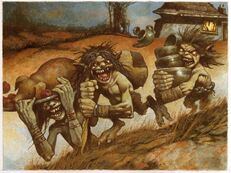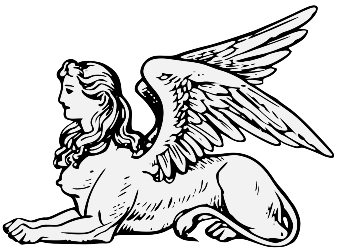
Depiction of Mouros
The Mouros are a race of supernatural beings from Galician, Asturian, Leonese and Portuguese mythologies.
Etymology[]
The Latin word maurus (hence the gal. mouro) for the philologist Isodoro Millán comes from the Celtic mrvos akin to the Indo-European term mr-tuos, which leads us to the Latin mortuus. For others, the name is related to the Galician ouro.
Galician mythology[]
Many authors maintain that the Mouros were already disappeared races. And it is that the Mouros were creatures that lived underground in dens and tunnels under the earth, where —depending on the area— they were dedicated to the extraction of gold (hence the reason for their name). They were presented as "unbaptized" and pagan (it must be remembered that Galicia was heavily influenced by the church at that time). The Mouros worked in goldsmithing and in some cases were dark-skinned, as if they were foreigners to the Galician land, while the Mouras had a reputation as sorceresses and were redheaded ("blonde" is used in Galician to refer to the color red, not yellow as is commonly thought) of fair complexion. They are the same as humans except that they live underground, are rich, have magical powers, or live under some enchantment; they usually appear to people alone proposing tests of courage, or they carry out business or exchanges with humans for which they are paid with gold, except if they tell others the origin of their wealth (the business with the mouro) in which gold turns into stones or coal. They also had a reputation as guardians of fabulous treasures, which constitute the origin of the wealth of several families.
The mouros are also the form that the people had centuries before explaining the origin of the castros, the mámoas (burial mounds) and other structures of ancient origin and unknown to the peasants. It was also said that the Mouros had lived in past times in Galicia and that they were constantly fighting against different peoples such as Romans , Visigoths, French, etc. Until they were expelled from this land, the vast majority. This legend tries to explain the military fortress aspect of the Galician forts.
It is usual that in the mentality of the peasants, despite the fact that the Mouros were powerful and pagan, they lived in a very similar way to that of the Galician peasant people since this people did not know any other way of life; the Mouros buried their dead and honored them, heard their cult masses and had their own Mouro priests. In addition, they liked to eat meat, drink wine and dance at night, in addition to being very given (the Mouras especially) to try to seduce the peasants. They also used to make deals with the villagers whereby the Christian must periodically deliver something to the Mouro (normally milk, wine or some good that the Mouro did not have) and he pays a high price, but the Mouro demands total discretion regarding the covenant. Of not being able to stand the peasant without telling it,
Apart from popular legends, the Mouros appear in various Galician toponyms, usually indicating the presence of forts, burial mounds, Roman mines or any type of ancient ruins.
Asturian mythology[]
The Mouros are a race of magical beings who lived in Asturias since the beginning of time, for an unknown reason they were forced to live underground, exercising the trade of mining , metallurgy or goldsmithing. They are the builders of dolmens and forts, due to their way of life they have great treasures that are protected by spells. They rarely go outside except to gather food, and they only come out at dusk or at night or on very special days such as the night of San Juan . They do not usually mix with humans, except in casual encounters.
